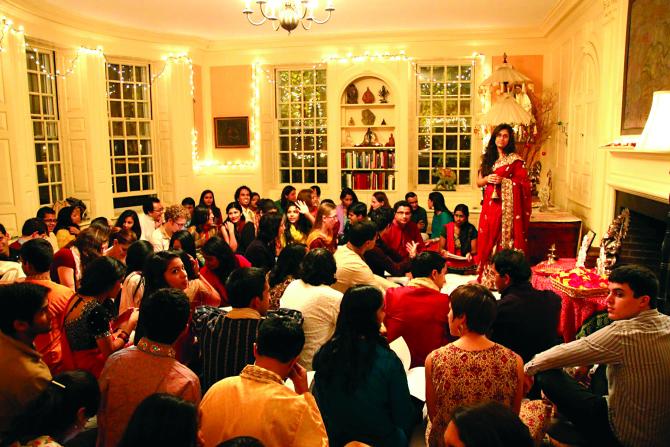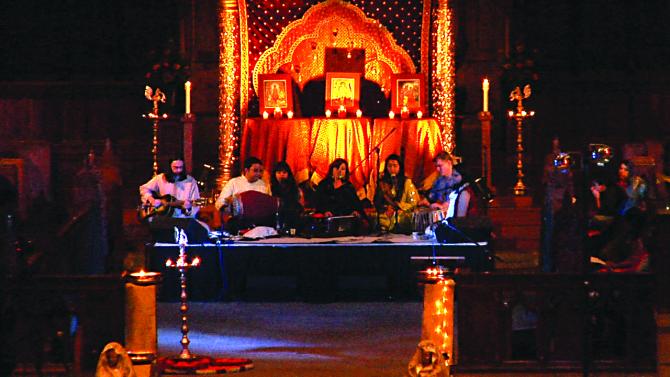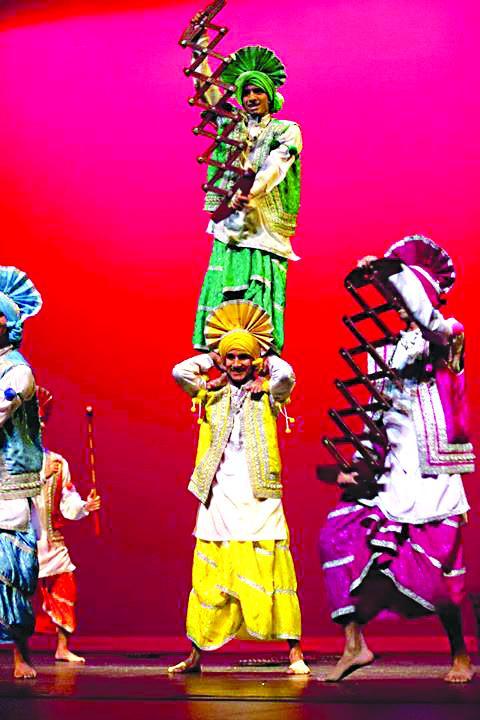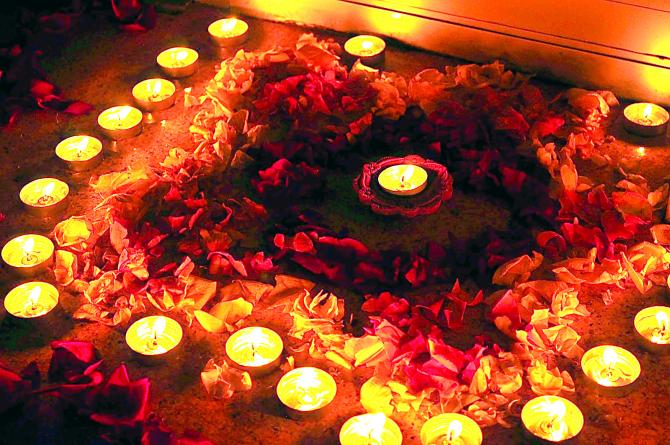 | « Back to article | Print this article |
Diwali on campus
What was once a small affair in the common room of a freshman dormitory is now a display of South Asian music, dance, art, comedy, and more, finds Chaya Babu.
A young man with brown skin and messy black hair walked around the sun-drenched Duke University campus with a camcorder, the kind that no one uses anymore. It was October 2001.
The man -- Farhan, a senior at the university -- stopped a classmate abruptly and asked, ‘Hey man, what is awaaz?’
‘What?’ the student answered, looking startled and confused.
‘Awaaz. What is awaaz?’ Farhan repeated, making sure to capture the exchange on film.
“Um… it’s a food. Yeah, it’s a food,’ was the reply.
Others had shot-in-the-dark silly guesses like ‘monkey’ or ‘space shuttle.’ Even those who knew that awaaz means ‘voice’ in Urdu, didn’t understand the reference as it was being used on the grassy quads and stone walkways that fall.
Weeks later, at Duke’s annual Diwali show, the video was played as an opener to the programme, which brought together dance performances, spoken word pieces, and musical acts for a weekend of celebrating South Asian culture.
2001 was the first year that the university’s festival season show was given the symbolic title of Awaaz. As it continues to be known. Prior to that, it had been simply known as Diwali.
“Sometimes the message gets lost because it is such a popular event,” said Anshul Mital, president of external affairs for Duke University’s South Asian student association Diya.
“It’s an extravagant thing, but the whole purpose of the show is two-fold: One, to celebrate South Asian culture and bring attention to Diwali. And two, to also rally behind a particular cause that we collectively find to be meaningful.”
Ajay Parikh, co-president, Diya, said that Awaaz has now become grand.
Preparations for the events begin at the end of the prior school year, before the summer.
This year, November 8-9, there will be 17 acts in the line-up.
Ajay said it’s an “ornate expression of multiculturalism.” The show has grown in popularity so much so that Anshul called participating in the Senior Bhangra dance “a bucket list” thing to do for all fourth-years.
This year, over 600 seniors, more than one-third of the class and obviously not all of them South Asian, signed up to be in it.
“One thing that’s really important to note is that people come in with very different ideas of what it means to be a part of a South Asian community at a university,” Ajay said.
Pooja Jain, a 2005 Duke alum, said, "I was nervous about participating in my college Diwali show because I had not performed a choreographed Indian dance before.
The rehearsals were insanely long and at crazy hours, but they were so much fun. Laughing about our crazy parents and practicing silly Bollywood theatrics -- it was easily one of the best experiences I had in those four years."
Diwali on campus
Participating in the Diwali show definitely helps me feel closer to many Indians on campus,” said Arnav Kejriwal, a senior at Washington University in St Louis, Missouri. “But given the show’s departure from the traditional Hindu meaning of Diwali, I also feel a bit conflicted about how the show represents both Indian and Hindu culture.”
What he says is true of many university events that are supposed to honour the Indian holidays that take place this time of year.
The festivities are so widely embraced by a diverse set of students that the original intent of recognising a religious time is overlooked.
What was once, many years ago, a small affair in the common room of a dormitory, like in Duke’s case, is now often a large, weekend-long display of South Asian music, dance, arts, politic commentary, comedy, and more.
Diwali on campus
Seniors at many universities said the enthusiasm of participants creates a spirit of warmth and positive energy that they look back fondly at over the years.
“I have always felt the need to reconnect with my Indian community and Indian identity,” said Siddharth Umapathy, a junior at the University of Miami, who came to the United States from India as a toddler and grew up in Texas.
“These events have introduced me to unique dance styles that come from different regions of India. They show that there is a lot more to our Indian identity than just what our families may teach us about their particular region of the country. India has over a billion people, yet we still remain so connected,” he added.
Ambika Subramaniam, a Washington University senior, said for her it was more about the people.
“The one greatest part about Diwali is that there is such a strong feeling of community, she said. “Especially in the week leading up to it. South Asian students just bond 24/7. It immerses you in this network on campus that almost reminds you of home a little bit.”
Ambika is from New Orleans and has been a Bharata Natyam dancer since she was 3. She knew she wanted to do something with Indian dance as soon as she arrived to Washington University as a freshman. An Indian friend from home recruited her onto the Garba team. As a senior now, she’s one of the main choreographers for the Diwali show’s Garba number.
A formal event held by Ashoka, the South Asian students association, also takes place around Diwali.
Diwali on campus
Since 2008 -- when Vineet Chander was appointed Princeton's first Hindu chaplain -- Diwali has been celebrated at the university chapel every year.
Chander had told India Abroad that Diwali at the chapel symbolised how the Hindu community had grown in the US and continued to do so.
***
At Harvard, the Harvard India Student Group will be organising a joint Diwali function this year. For the first time the Harvard Law School, Business School, the Kennedy School, the School of Public Health, and the School of Design will bring their Indian clubs together to celebrate the festival.
"Overall Harvard is moving toward more of a 'one Harvard' perspective, so with the creation of these university-wide student groups, one of the objectives was to be collaborative and pull the entire community together through these kinds of functions," said Ishani Mehta, co-president, HISG, and second year law student.
There will be a cultural celebration night November 10 on the campus where Indian food will be served and then groups will put up performances. A puja will also be organised separately November 3.
Mehta, who is from Delhi, said, it's great to have such an event on campus in America.
"Diwali is supposed to be inclusive,” she said, “We want everyone to enjoy it -- and when I say everyone, I mean not just Indians, but all students and faculty at Harvard.”
Rishab Mehan, co-president, Dharma, the undergraduate Hindu student association, said the puja is an intimate event that takes place in the Lowell House Masters' Residence.
“The event is extremely significant to the undergraduate community,” Mehan said.
“Diwali is one of the most important festivals in the Hindu calendar and a time that brings family and friends together. As a result, a lot of undergraduates might miss celebrating Diwali with their family. The festivities at Harvard give them the opportunity to celebrate in a setting that feels like home."



